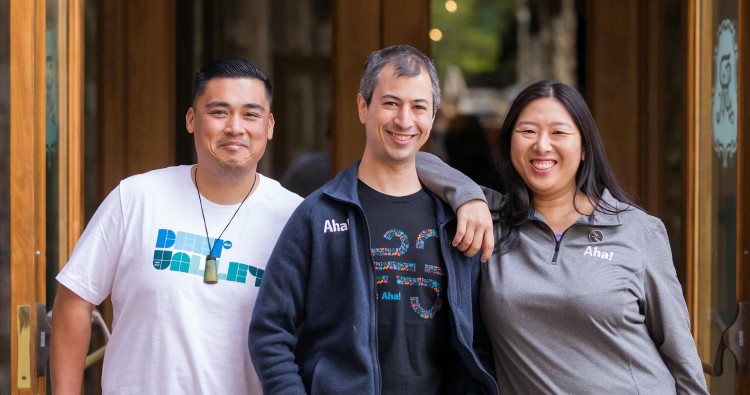
Members of the Aha! Product Success and engineering teams connect at our company onsite in Deer Valley, Utah. | Photo by Jodi B Photography
Your engineers want more feedback
You should honor the engineers who help you bring your product strategy to life. Because without them, you just have a bunch of well-formed ideas. But you do not have anything that creates customer value. So when engineers tell you that they need more of something, you should listen. When you do, you will often find that they are looking for deeper customer understanding.
The best product managers review and parse customer feedback with engineers regularly — collaborating to deliver solutions that delight your users.
Why do so many engineers struggle, feeling like they are shipping features into the abyss? Some product managers are slow to pass along customer feedback. Others give that feedback promptly, but it is too vague ("We need to improve the usability"), lacks relevant context, or is disconnected from the product strategy. Even more frustrating, some product managers only share feedback when something breaks or goes wrong.
If any of this sounds familiar, you are not alone. And there is no blaming of product managers here. Many of you are so busy that you fall into reactive mode, putting out each new fire as it starts. The irony is that devoting regular time to analyzing customer feedback with engineers will make everyone's life easier. It gives you a valuable opportunity to deepen trust with your cross-functional teammates, enhance your understanding of what customers need, and build a stronger product together.
It is not enough to share customer feedback with your engineering teammates — you also need to have meaningful discussions about what the feedback means, why it matters, and what will happen next.
Our team at Aha! is fortunate in that we use our own products every day. This gives our engineers empathy and firsthand knowledge of what users encounter. Every engineer at Aha! also does regular customer support rotations to answer technical questions and stay close to the customer experience. These are useful exercises, but they do not replace thoughtful conversations with product managers.
In that spirit, we asked five Aha! engineers to share what makes for a fruitful discussion and helps them better understand customer challenges. Here is what they said they would like product managers to do:
Remove pressure
"After receiving customer feedback, the product manager and I usually have an informal discussion upfront. Instead of jumping right into a live call, we start with a casual conversation on Slack. I get to hear about the problem broadly and begin to think it through. This relaxed approach keeps us from fixating on one solution and investing too much too early." — Justin Weiss, Principal Software Engineer
Notice patterns
"Sarah, our product manager for Aha! Notebooks, acts as a point of contact between our engineers and customers. She analyzes the feedback, finds common topics that arise, and then brings them up with the broader team in our weekly meetings. Summarizing large amounts of feedback and pointing out patterns really helps me understand our customers' needs." — Nico Arias-Gonzalez, Software Engineer
Share often
"Because I develop tools for our internal team, I'm fortunate that my own Aha! teammates are the customers for the features I build. After I updated a Zendesk plugin for our Customer Support team, for example, those team members let me know right away what they liked and what could be improved. Passing along small bits of feedback quickly allows us to move fast and make updates as needed, instead of deploying a large change-set all at once." — Gabrielle DeWitt, Senior Software Engineer
Prioritize together
"After the product manager summarizes the customer feedback, we talk through effort, scope, trade-offs, and timing. This helps us determine the technical feasibility of making different changes and form a rough idea of priority and timeline. Then, we can both be confident in what the next most important piece of work is." — Chris Zempel, Senior Software Engineer
Decide against
"Both parties should be ready to say no, even when it's tough. Our product managers generally bring an initial idea to work off of. I might have suggestions for new approaches or will push back when a proposed solution will be too challenging to implement. Unfortunately, we'll sometimes have to conclude that we can't prioritize taking action at that time — due to the amount of work required versus the value of the improvement for our customers." — Yuko Takegoshi, Senior Software Engineer
A close and happy relationship between product managers and engineers leads to happier customers and a better product.
How can you start cultivating these stronger relationships? Focus on exercising the same muscles that serve you well in the rest of your product development work: Lead with curiosity, listen closely, respect your teammates' expertise and unique perspectives, and be willing to explore solutions together. This is how you build and deliver features that are truly lovable.
Bold product development teams rely on Aha! to build lovable products together. Start a free trial today.




